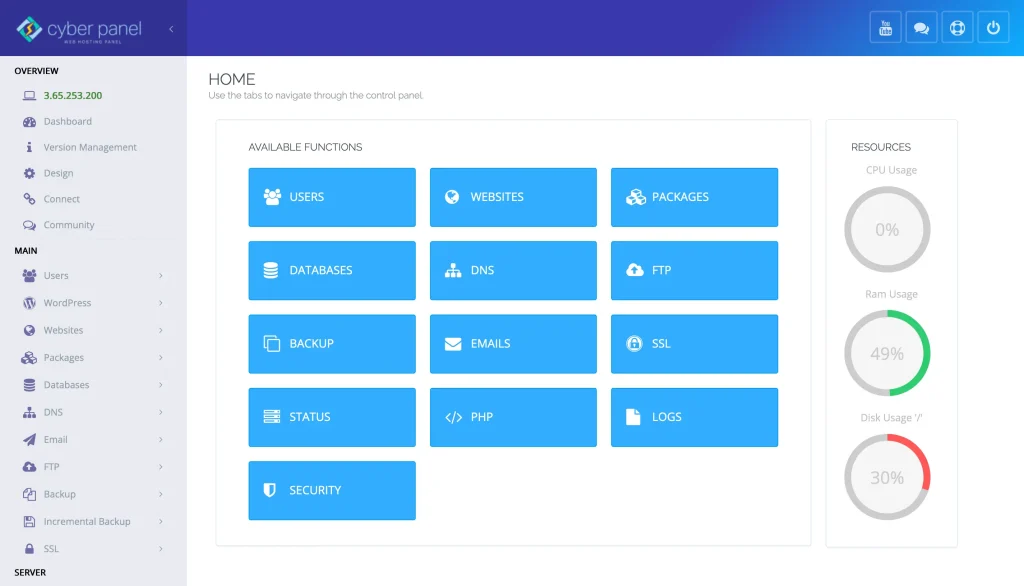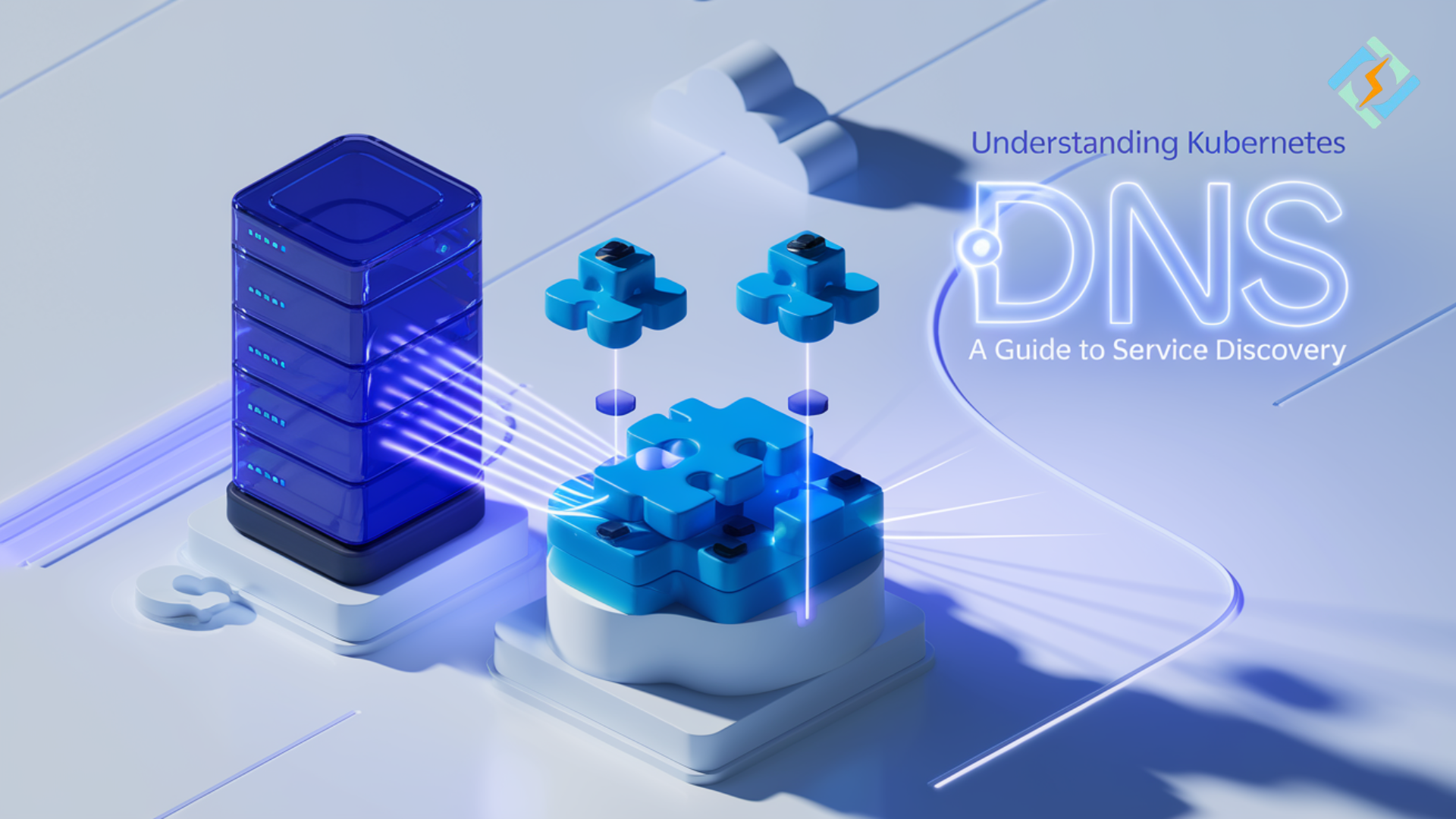In today’s cloud-native environment, containers dynamically automate. Kubernetes DNS comes as a single solution point. It has emerged as the cornerstone of interconnectivity. It also automates service discovery and enables reliable networking within and beyond the cluster.
This article attempts to cover various aspects of Kubernetes DNS, such as its internal and external components, along with the business functions of CyberPanel regarding its DNS Management.
What is Kubernetes DNS and How it Works with Services?
Kubernetes DNS is a built-in DNS system that enables the communication of pod and service traffic by providing service and pod DNS names, accessible by human-friendly names, instead of IP addresses. This indirection makes it easier to discover services, particularly when migration or scaling of pods is occurring dynamically.
Kubernetes DNS is globally accessible in the form of its internal domain. Since all services receive the DNS names within the network available via assignment, no particular service should rely on the IP address, but on the name instead. That makes work easy and service clear.
How Does Kubernetes Service DNS Simplify Internal Communication?
Kubernetes gives every service a stable DNS name that resolves to the service’s cluster IP. This feature provides direct pods to service connectivity with an IP address and a predictable DNS name.
Get exclusive access to all things tech-savvy, and be the first to receive
the latest updates directly in your inbox.
For example, a service named my-service in the default namespace can be addressed with the DNS name my-service.default.svc.cluster.local. It hides the underlying network complexity, allowing application developers to concentrate on their business logic rather than infrastructure details.
What is External DNS in Kubernetes?
Kubernetes external DNS takes away the pain of manually operating external DNS servers. It automates the management of DNS records with external DNS providers. It also ensures that the service-based external availability is accessible by a consistent domain name. With support for providers such as AWS Route 53, Google Cloud DNS, and Azure DNS, the External DNS allows external clients to access services consistently, even as the resources that they rely on change over time. This automation reduces manual overhead and minimizes the risk of configuration errors.
What is External DNS in Kubernetes & Why is it Needed?
In Kubernetes, external DNS will handle maintaining DNS records for external DNS providers. For example, when exposing services from outside the cluster, so that all of them are available at a single domain address. It watches Kubernetes Services and Ingresses to discover the routes and updates a DNS Service with the entries.
Backends that are supported out of the box include AWS Route 53, Google Cloud DNS, Azure DNS, and others; ExternalDNS makes sure your services are always reachable with a DNS name that is only limited by the length of the DNS provider’s supported domain name.
This automation is a crucial aspect of transitioning operations from human-performed to a potentially automated state.
How to Configure Kubernetes DNS for Optimal Performance?
To configure Kubernetes DNS, you create a CoreDNS configuration so that it indicates to your cluster. Typical configurations include specifying upstream nameservers, defining stub domains, and configuring caching parameters.
For instance, in order to forward DNS requests for a given domain to an external resolver, you could edit a CoreDNS ConfigMap as follows:
apiVersion: v1
kind: ConfigMap
metadata:
name: coredns
namespace: kube-system
data:
Corefile: |
.:53 {
errors
health
kubernetes cluster.local in-addr.arpa ip6.arpa {
pods insecure
upstream
fallthrough in-addr.arpa ip6.arpa
}
prometheus :9153
forward . /etc/resolv.conf
cache 30
loop
reload
loadbalance
}What Are Some Best Practices for Kubernetes DNS Management?
For a healthy and efficient DNS configuration in Kubernetes, the best practices include:
- Scale CoreDNS to the right size: Update the number of CoreDNS replicas for the size of the cluster and workloads to make sure there are no bottlenecks.
- Node-local DNS Cache: When a node-local DNS cache is deployed, DNS queries get resolved locally on each node, reducing latency.
- Measure DNS Performance: Monitor DNS query performance with, for example, Prometheus and Grafana to ensure that any issues will be detected quickly.
- Update DNS Configurations: Update CoreDNS and its configurations regularly to maximize use of the capabilities and security improvements.
- Secure DNS: Use DNSSEC and other security technologies to defend against DNS spoofing and other forms of attack.
Following these best practices will help you establish a robust and high-performance DNS infrastructure in your Kubernetes.

How to Configure External DNS in Kubernetes for Smooth Integration?
The process for setting External DNS involves running it as a Kubernetes deployment and pointing it at your selected DNS provider. Here’s a high-level overview:
- Install External DNS: Install External DNS using Helm or install it from the official manifest.
- Configure Source Account Access: Enter the relevant credentials for your DNS provider (e.g., AWS IAM credentials for Route 53).
- Define Source Resources: Tell External DNS which Kubernetes resources (Services, Ingresses) to notice.
- Domain Filters: Restrict External DNS to specific domains to protect from accidental modifications.
- Deploy & Monitoring: if you have already created the configuration to apply and monitor that the DNS records are correctly created and updated.
Common Issues & Solutions Within Kubernetes DNS
Kubernetes DNS can show up issues. Here are common issues and their resolutions:
| Issue | Resolution |
| DNS queries timing out | Check CoreDNS pod health and logs; ensure sufficient replicas are running. |
| Incorrect DNS resolution | Verify service and pod names; ensure correct namespace usage. |
| External DNS not updating records | Confirm External DNS has appropriate permissions and correct configurations. |
| High DNS query latency | Implement node-local DNS caching and optimize CoreDNS settings. |
| DNS record conflicts | Use domain filters to restrict External DNS to specific domains. |
Role of CyberPanel

A next-gen web hosting control panel, CyberPanel, also comes with some cool features to manage DNS records conveniently. It extends the functionality of Kubernetes DNS beyond service discovery. Kubernetes handles the internal DNS, but CyberPanel can handle external DNS records as well, allowing all domain settings to be managed in a single place.
Adding CyberPanel to Kubernetes will make DNS management easy and your users more satisfied.
FAQs: External DNS Kubernetes
Q1: What is the use of CoreDNS in Kubernetes?
The default Kubernetes DNS server, CoreDNS, handles internal name resolution for services and pods.
Q2: How do I resolve DNS issues in Kubernetes?
Use, for example, kubectl logs to look at CoreDNS logs and ensure that the DNS configuration is properly set in the CoreDNS ConfigMap.
Q3: Do we have to use External DNS for all Kubernetes deployments?
Not always. If you are running services that can be used outside of the cluster, External DNS is a must. The default DNS provided by Kubernetes is enough for the internal-only service.
Take Your Kubernetes Networking To The Next Level Today!
And finally, you should become a wizard of Kubernetes DNS. Since it is part of the smooth operation and discovery of services inside and outside our cluster. With some of the best practices, tools, and platform integration in tools such as External DNS and features as seen in CyberPanel, you can easily build a resilient and elastic domain name system that can cater to the more demanding modern applications.
Are you ready to level up your Kubernetes game? Apply these advanced DNS techniques now and make your cluster usable!



